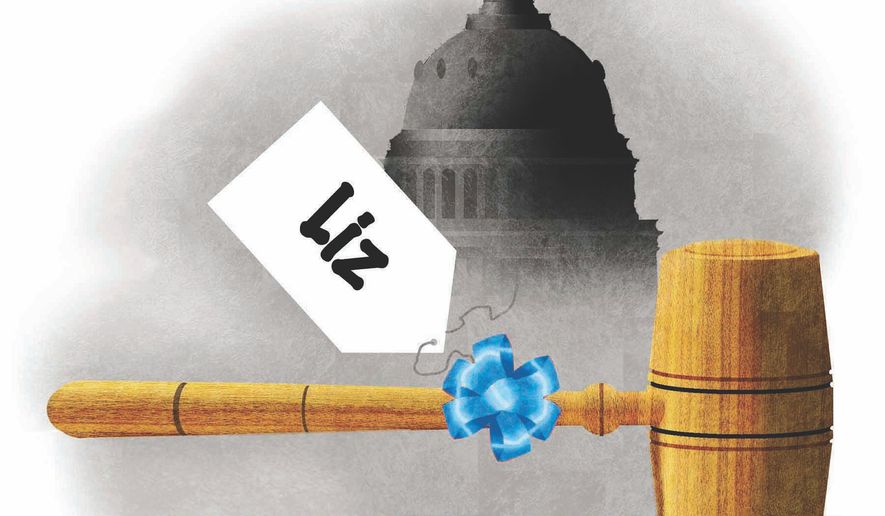OPINION:
Next month, Republicans will take control of the House of Representatives with a tiny majority — even tinier than the one enjoyed by Democrats for the past two years.
Soon will come House leadership elections, which are almost always simply a pantomime. The Democrats will nominate and support their candidate for House speaker, and the Republicans will do the same. It’s unclear whether Rep. Kevin McCarthy can assemble enough Republican votes to put him over the top, but ultimately, after however many ballots, the speaker of the House will be a Republican, as Republicans won’t allow any Democrat option.
But the Democrats could do something unique, strategic and historic — they could act consistent with their rhetoric about threats to democracy, and they could dramatically influence the course of American politics. They could nominate outgoing Rep. Liz Cheney for speaker of the House.
In the minority, a Democrat cannot win election as speaker of the House. No Republican would conceivably vote for the Democratic nominee. So why waste the opportunity? Why not see to it that a Republican who agrees with you on the Jan. 6 debacle is elected speaker, and deny the speakership to a Republican who has been inconstant, craven and ignoble in his fealty to former President Donald Trump?
Who would Democrats rather have as House speaker: Ms. Cheney or Mr. McCarthy?
Because the final Republican House majority is so small, there is an entirely realistic possibility that Democrats could peel off sufficient Republican votes to elect Ms. Cheney speaker. By nominating her, Democrats could use their limited power strategically. Why not elect as speaker the Republican of your choosing, rather than the choice of the Republican House Freedom Caucus?
This strategy is possible for two reasons: First, there is no constitutional requirement that the speaker of the House be a current elected member of the body. Some argue that it is an unstated assumption in the Constitution that House officers would be members of the body, but textualist interpretation doesn’t assume unstated text, and the courts are loath to get involved in the internal affairs of the other branches of government.
Furthermore, Republicans have already cast votes for speaker candidates who were not members of the body. In 2012, Rep. Louie Gohmert nominated Newt Gingrich as speaker, even though Mr. Gingrich had not been a House member since 1999. Mr. Gohmert and Rep. Paul Broun eventually voted for former Rep. Allen West as speaker, even though Mr. West had lost his reelection bid.
Beyond that, the election for speaker will be held with the new House, not the former House. The new House includes Republicans who owe no fealty to Mr. Trump, as well as Republicans who may not have voted for his impeachment, but who have been uncomfortable with Trumpism, and who feel liberated from Mr. Trump because of the humiliation they were handed by midterm voters. It also takes place after the completion of the damning investigation of the Jan. 6 committee.
Why, as a Republican, would I urge Democrats to embrace this strategy? Because Ms. Cheney is a rock-ribbed conservative who has acted consistently on a principled basis despite the risk to her reelection, while Mr. McCarthy has been an embarrassment, first criticizing Mr. Trump for his role in the Jan. 6 riot, but quickly pivoting toward slavering obeisance at Mr. Trump’s feet. If Democrats really believe their rhetoric about Mr. Trump’s purported threat to democracy, lining up behind Ms. Cheney as speaker would be a strategic step toward isolating and repudiating Trumpism.
Here’s why Democrats probably won’t embrace my suggestion: They DON’T act consistent with their own rhetoric about Mr. Trump. While calling him a threat to democracy, they poured millions of dollars into the campaigns of Trump-endorsed primary candidates, knowing such candidates would be easier to defeat in the general election. And they were proved correct.
Still, were I a Democrat, I would see denying Mr. McCarthy the speakership as a worthy project, and rewarding Ms. Cheney, who campaigned for some Democratic candidates, as a reasonable consolation prize for having lost the House majority. They probably won’t go for it, but it would be a lot cooler if they did.
• Tom Giovanetti is president of the Institute for Policy Innovation (IPI), a conservative policy think tank based in Dallas.




Please read our comment policy before commenting.